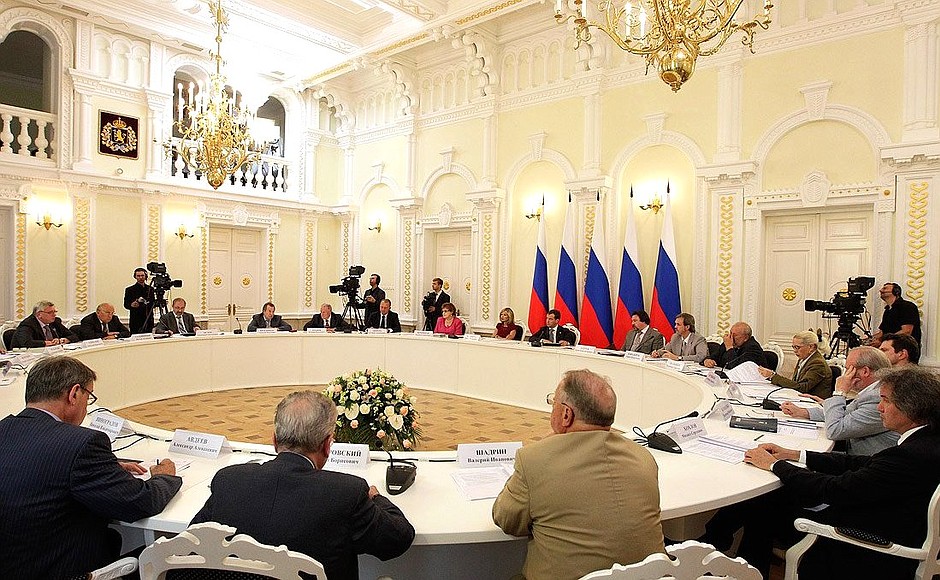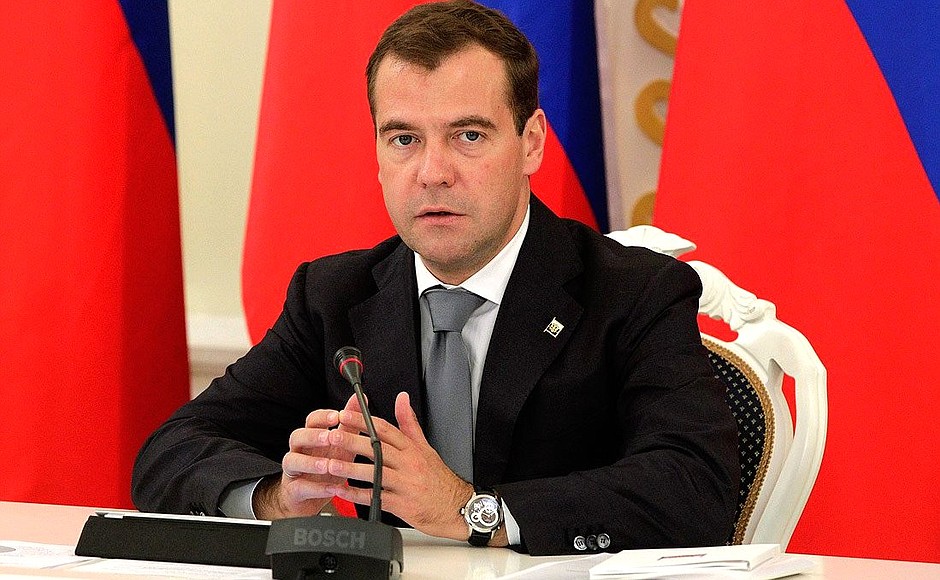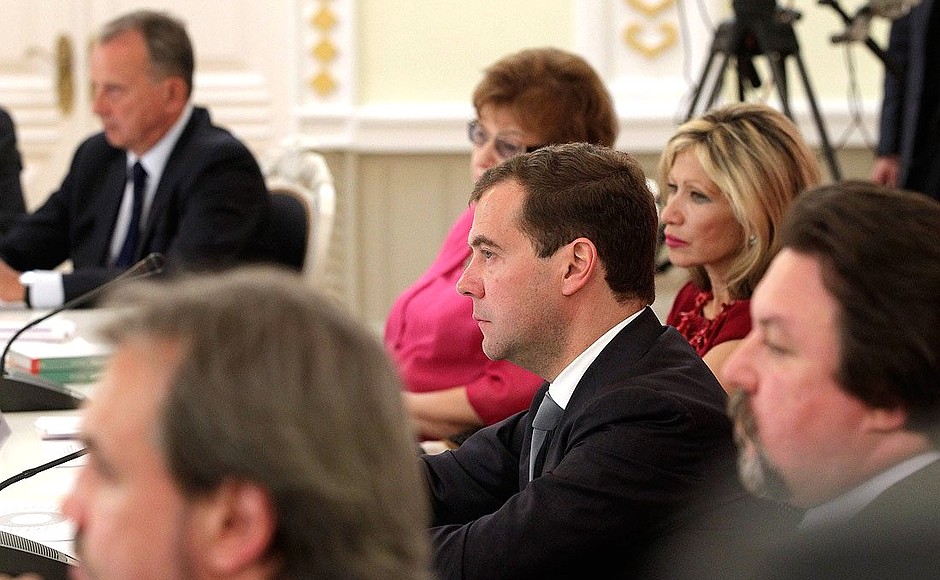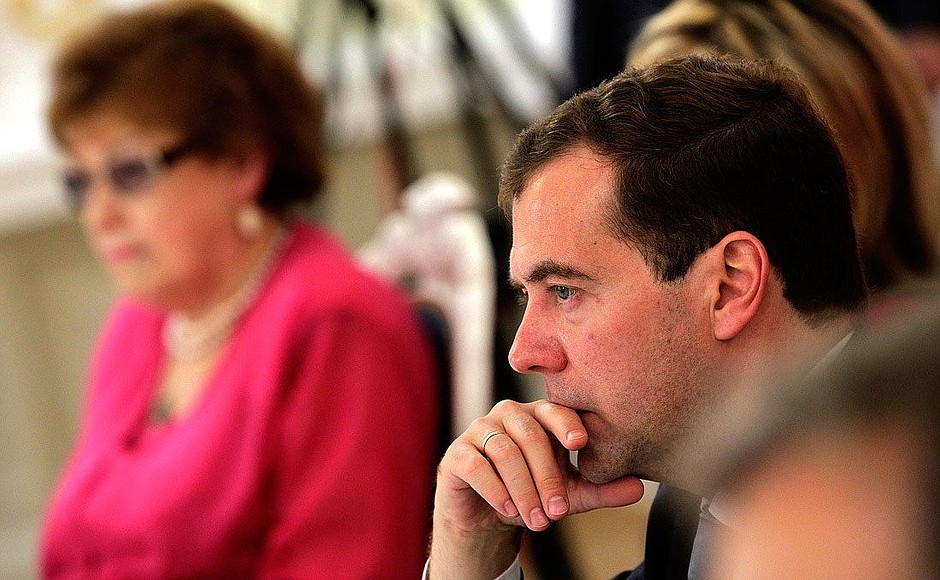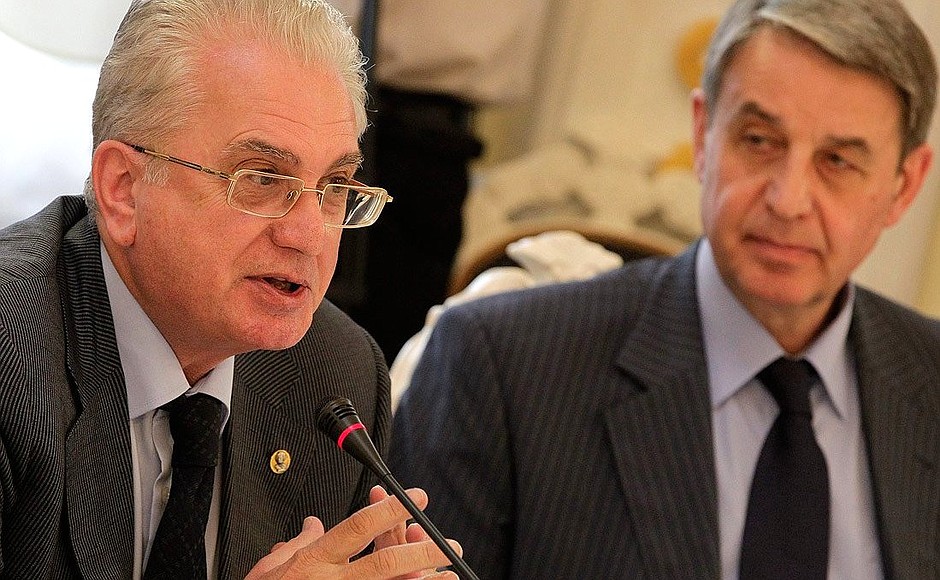The meeting also addressed issues of preserving cultural heritage and teaching history in schools and universities.
* * *
President of Russia Dmitry Medvedev: Good afternoon, colleagues. We are meeting in a special place – ancient Vladimir – because next year, we will be celebrating several significant dates in the history of our Motherland. One of them is the 1150th anniversary of Russian statehood.
I just had a very interesting discussion on this topic with our historians. But there are other dates in our nation’s history that are also important. We will be marking the 200th anniversary of Russia’s Victory in the Patriotic War of 1812, the 150th anniversary of Peter Stolypin’s birth [1862–1911, public official in the Russian Empire] and several other, regional dates that will greatly influence the topic of our meeting today. I have brought you together to discuss substantive issues in preparing for these anniversaries.
”Russian statehood initially developed on a multi-ethnic basis and did not follow a path of division, but rather, a path of unification. And that is the only reason why today we have such a unique nation. Even then, fragmentation was seen as a factor of weakness, and in the process of creating the nation, there were no significant barriers to cultural and religious diversity which, again, allowed for the creation of such a unique state as the Russian Empire, and subsequently, the Russian Federation. I feel that this is one of the truly serious, genuinely fundamental lessons in history.“
The anniversary of our statehood will be celebrated after a fairly long interruption. Let me remind you that in the past, there used to be large-scale celebrations, held a century and a half ago. Moreover (and I just spoke about this with the historians), the 1000th anniversary of Russia occurred during one of the most difficult, and at the same time, dynamic periods in the development of our nation. The so-called great liberal reforms were underway, changing our entire nation and determining the direction of its development for many years to come. Indeed, Alexander II, who initiated these anniversary celebrations, felt that they would not only stimulate the rise of our nation, but also help bring the authorities and the people closer together. And as you know, these reforms were conducted and had an enormous impact on the subsequent development of our nation.
The historians and I discussed how our nation formed. Clearly, all the dates are somewhat symbolic in nature, because a nation does not emerge in just one year, or two, or even a decade. But nevertheless, that was the period when certain cities were born, and not just in our nation, but in Western Europe as well. And the rapid growth during the Middle Ages is usually estimated as the time when nations were born.
After a period of denying the significance of these developments (this was particularly typical of Soviet times), we now have a more measured approach to those events of the past. I specifically asked our historians just now, how much this position currently prevails in Russian legal science. Most of them feel that this is precisely the case, that of course it is important for research in and of itself, as well as for celebrating the corresponding anniversary. I was telling our colleagues, and I would like to tell you as well, that when I was finalising the Executive Order, I thought for a long time about whether to sign it or not. Ultimately, the arguments for celebrating this symbolic anniversary of Russian statehood prevailed, because today it has significance, not so much in terms of research, but more on an entirely practical level. And the intention is clear: to consolidate our nation and our people, in order to further develop our large and very complicated nation.
There is one other topic that historians agree on: Russian statehood initially developed on a multi-ethnic basis and did not follow a path of division, but rather, a path of unification. And that is the only reason why today we have such a unique nation. Even then, fragmentation was seen as a factor of weakness, and in the process of creating the nation, there were no significant barriers to cultural and religious diversity which, again, allowed for the creation of such a unique state as the Russian Empire, and subsequently, the Russian Federation. I feel that this is one of the truly serious, genuinely fundamental lessons in history.
Moreover, consolidation into one state also promoted the emergence of common values. These common values served as the foundation for developing new norms of social life and common rules of behaviour, as well as the development of relations with European and subsequently Asian nations. And, of course, people adopted the leading examples of culture and modern ideas of the time.
There is another fact that has to do with the law, which is of particular interest to me as a member of the legal community. We have discussed it with historians. Initially, Russia was formed as a law-governed state, that is, as a state with its own rules of conduct that in modern terms we refer to as laws. These rules of conduct regulated relationships between people, maintained public order, and, therefore, sustained a certain lifestyle and values.
This idea of a law-governed Russian state at that time was part of the general idea of justice: the government is needed so that the state can develop and people will live better, and so the government should take into account both the interests of ordinary people and their traditions, the traditions of different peoples who live together in a large country.
Subsequently, our legal system produced more and more new models, the system became increasingly complex, including ultimately the Code of Laws of the Russian Empire, and later this tradition continued during the Soviet period, which promoted the legal development of our public life.
”Initially, Russia was formed as a law-governed state, that is, as a state with its own rules of conduct that in modern terms we refer to as laws. This idea of a law-governed Russian state at that time was part of the general idea of justice: the government is needed so that the state can develop and people will live better, and so the government should take into account the traditions of different peoples who live together in a large country.“
Why do I say this? Because there are all kinds of negativist notions, denying the legal nature of the Russian state, showing a lack of respect for our legal traditions, the sense that we are inferior in some way up to the point that statehood came to Russia from somewhere in Western Europe, whereas we were not able to come up with it ourselves. We all realise that this is completely wrong, of course, but at the same time it is very damaging. That's why I think that the discussion about the legal nature of the Russian state also has value in itself. If it is a law-governed state, fundamentally based on the law, even with all its defects, then such a state can develop along the democratic path, which is our goal today. Otherwise, the conclusion would have to be different, and that would set us back 100 years.
The upcoming anniversary is an excellent occasion to reflect on modern challenges. Historical heritage gives us invaluable material for this, but at the same time it gives an impetus for future development. This development tool must incorporate national traditions and the traditions of different nations living together in our country, which can be traced back throughout Russian history.
I would like to hear your approaches to this and your findings. For eleven and a half centuries, Russia developed as a powerful civilisation, a multinational civilisation with a unique ethnic and cultural potential. This is our historical advantage, which, like every other advantage, entails certain challenges. Therefore, we must now do everything in our power for traditions of tolerance and mutual respect, which were ingrained in our culture from the very beginning, to remain the standard for society.
Why do I say that these traditions were ingrained from the beginning? For one simple reason. Because otherwise, despite the fact that these were historical states, independent states that subsequently merged into a single Russian state, they would not have been able to co-exist if they had not been linked by an internal power. They would have been scattered like the dozens and hundreds of states, principalities and various other entities around the world that disintegrated in the past. But we still remain a large state, and this is a very serious subject for discussion.
The preservation of cultural heritage has a profound importance. It is necessary to maintain the so-called genetic memory of a nation and to develop the identity of our people.
”For eleven and a half centuries, Russia developed as a powerful civilisation, a multinational civilisation with a unique ethnic and cultural potential. This is our historical advantage. We must now do everything in our power for traditions of tolerance and mutual respect, which were ingrained in our culture from the very beginning, to remain the standard for society.“
Our country has a very large number of monuments, many of which are among the world's treasures. At the same time we are all aware that many sites are not maintained as they should be. If you go on a walk around Vladimir you will see that there are some monuments in excellent condition, whereas the state of others is less than perfect. Therefore, our task is to try to save them, especially since many cultural monuments were lost in the Soviet period, as well as partly in the post-Soviet period and even in pre-Soviet Russia. As far as cultural monuments are concerned, we look considerably worse than Western Europe, though there are certain reasons for that. Wooden architecture, for example, is much more difficult to preserve than stone. In any case, however, today we must do everything possible to make an inventory of such monuments to make sure that none of these valuable objects of cultural heritage disappear from our maps.
Another subject we discussed with historians and which I think is also of some importance to all those present is family history. Almost three-quarters of our population do not know their ancestors, which is lamentable. Many are simply indifferent to the history of their city or village. Interest in this has been rekindled, but once again, if we compare ourselves to Western Europe or to other parts of the world, where virtually every person can trace his or her roots many generations back. This was erased from our memory and there were ideological reasons for that; as you know, people sometimes renounced their relatives and their social class. Yet it is part of our history, the attitude to one’s family's history determines the attitude to the history of the state. So, I think it also has a bearing on our topic today.
Another issue, also a crucial one, that has caused a great number of disputes is the teaching of history in schools and universities, although to a lesser extent at universities, as well as literature – not a problem with literature but with the teachers themselves, their inner readiness to adequately teach the history of our large and complex state, the problem of interpretation, the problem of the so-called consensus points.
Earlier we were talking about whether it is possible to hold different positions on all issues or whether there should be more uniform approaches on our national history, so that young people get a certain foundation regarding the development of our country – this is from the point of view of teaching at schools, I emphasise, not research because academics are justified in holding totally different, diametrically opposite points of view on a variety of events.
”Celebrating the anniversary of our state is not only our celebration and not only our significant date. I think we could very well mark the occasion with our close neighbours, I mean primarily Ukraine and Belarus. Moreover, we have common historical and spiritual roots.“
There are some obvious examples: the attitude to the Great Patriotic War, to World War II. Is it possible, for example, for history books to give an alternative interpretation of those events? I must say, in my opinion that would be harmful. But in any case, it is also a topic for a joint evaluation and collaboration.
One more matter: celebrating the anniversary of our state is not only our celebration and not only our significant date. I think we could very well mark the occasion with our close neighbours, I mean primarily Ukraine and Belarus. Moreover, we have common historical and spiritual roots. The year 1812 was important not only for our country, especially since statehood, according to the accepted theory, spread from the north and north-west to the south. In this sense, we are interested in making sure that our partners also take part.
The colleagues I have talked with have proposed some interesting ideas, for example to declare 2012 the Year of Russian History. I think this is an excellent idea because a large number of extremely important anniversaries will be marked next year, and at the same time, it will be an opportunity for us to pay more attention to historical science and to historical practice. We talked about a special venue for historians, about creating a dedicated website and forums. In general, I think it would all be a good idea.
Last March I signed an executive order on the celebrations, we set up an organising committee and are drafting a plan of events. Naturally, the whole nation, public organisations and the political establishment should also be involved in the preparations along with the authorities. I believe that academics and cultural figures should also take part, that is, those who are present here today.
It often happened in the life of our country that the study of history influenced political practice, which is probably a good thing. But the opposite also happened many times in our country: political practice had a direct bearing on the historical science, which is obviously very bad. We have a unique situation today because we are able to celebrate this anniversary properly and at the same time to give an impetus to the study of history, archaeology and a whole range of other disciplines related to the history of our state. Ultimately, this is done to create new opportunities for the development of our state.
I look forward to an interesting discussion, let's get to work.
<…>
